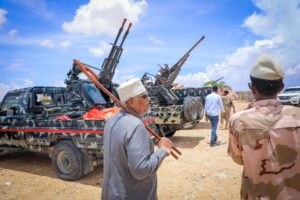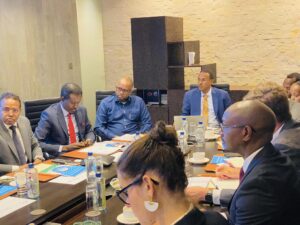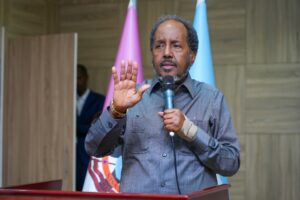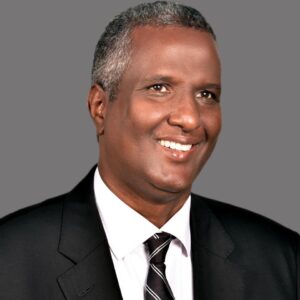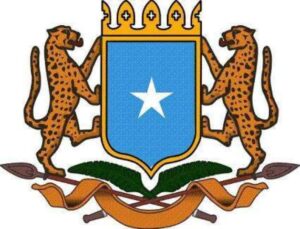MICHAEL KEATING SPECIAL REPRESENTATIVE OF THE SECRETARY-GENERAL FOR SOMALIA BRIEFING TO THE SECURITY COUNCIL ON SOMALIA
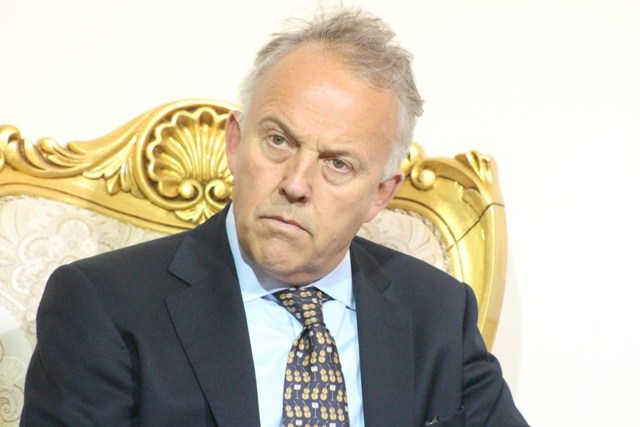
For immediate release
MICHAEL KEATING SPECIAL REPRESENTATIVE OF THE SECRETARY-GENERAL FOR SOMALIA
BRIEFING TO THE SECURITY COUNCIL ON SOMALIA
23 MARCH 2017
Mr. President,
As the Secretary-General said on his first field visit since taking office, Somalia is experiencing a moment of both tragedy and hope.
Tragedy, because a drought-induced humanitarian crisis is now engulfing the country, with imminent risk of famine.
Hope, because the recent electoral process has created momentum for fresh political engagement amongst Somalis. The announcement 48 hours ago of the cabinet, including six women, is another important step forward.
Mr. President,
Over six million Somalis — half the total population — are now in need of assistance. Nearly three million, mainly women and children, require immediate life-saving support, including growing numbers of displaced people living in miserable conditions.
Somalis, including politicians, business people, civil society and members of the diaspora, are taking responsibility for drought response. This distinguishes Somalia from other countries facing humanitarian catastrophe.
President Farmaajo has declared a national disaster within days of taking office. He is using all available platforms to mobilise national and international support.
Access remains a challenge, including in Al Shabaab-controlled areas. But compared to 2011, when 260,000 people died, the scope for responding to the crisis is greater.
Cellphone coverage and money transfer options have expanded; data on needs and assessments have improved; controls on resources and partner vetting is stronger; and operational capacities have grown.
Humanitarian partners are scaling up the response including through the private sector and cash programming in affected areas. More people are now being reached with food aid, nutritional support, health care services and access to safe water.
But much more is needed.
The most urgent challenges include funding for immediate life-saving action, in particular for the cholera response, which has now affected 11 of the 18 regions. Treatment centers and units are being opened throughout the country, but the disease continues to spread. Rapid scale-up of treatment and preventive measures are urgently needed before the rains, which will only further exacerbate the problem.
The Famine Prevention Operational Plan seeks $825 million to reach 5.5 million people by June. The plan is currently 32 per cent funded. Funding and cash flow constraints prevented a significant increase in response activities at the beginning of the year.
More resources are needed by end of March to enable partners to reach affected people before it is too late.
I welcome recent generous contributions by many countries in response to the Somali Government and the UN’s call for assistance, including a very generous contribution from your government, Mr. President.
Had the electoral proess not delivered a result accepted as legitimate, drought response efforts would be much more difficult.
Instead, the electoral process has created a sense of hope.
The new parliament is more diverse, younger and female than any before it. The elections were largely peaceful and were not derailed by Al Shabaab. AMISOM and Somali security and intelligence forces did a great job protecting electoral sites.
The presidential election was conducted transparently. The former President, Hassan Sheikh Mohamud deserves credit for a smooth and peaceful hand-over.
The elation that greeted President Farmaajo on February 8th transcended clan and regional lines.
The outcome of the process has generated widespread goodwill. As PM Hailemariam of Ethiopia said, “Somalis have made history and set a great example to countries emerging from conflict”
The complexity and imperfections of the electoral process have not diminished the expectation that there must be One Person One Vote in 2020.
Preparations must begin now to establish the necessary legal and administrative framework, to lay the groundwork for inclusive elections and to permit women to compete on equal terms to men. To that end, the UN is fielding a Needs Assessment Mission this week.
The new government and parliament now have an opportunity to use the goodwill to reboot efforts to build a functional and inclusive federal state – to tackle the socio-economic, structural and political issues that make millions of Somali women, men and children so vulnerable.
For a functional and truly sovereign federal Somalia must find ways to rely less on foreign funds and more on its own resources.
Unless Somalia can start attracting serious investment and generate domestic revenues, state-building will remain only an aspiration, and the country will remain perilously dependent and vulnerable to weather-related shocks.
This will require not only greater institutional capacity but also a settlement between the government and the private sector.
Taxes should be collected by the state in return for assurance that funds will be accounted for, and be used to provide basic services, including security and the rule of law.
The President and Prime Minister have committed themselves to improvements in public financial management, transparency and accountability, including vigorous steps to fight corruption, which they see as drivers of insecurity.
These will not be easy. They deserve our support, including incentives for the private sector. Support is needed to clear Somalia’s arrears and allow her to move down the path towards debt relief.
A more immediate challenge, Mr. President, is to eliminate the scourge of terrorism. The cost is just too high, both in terms of human life and lost opportunities for Somalia, but also for Somalia’s neighbours and the international community, including countries serving on this Council.
Success in degrading and dismantling Al Shabaab requires a multi-pronged approach, embedded in a political strategy led by the Somali government.
This needs to embrace support for AMISOM’s operations, Somalia sector security reform, resolution of local conflicts, stabilization and extension of state authority in liberated areas, and addressing the governance and rule of law deficits that give Al Shabaab oxygen.
Somalis want to assume greater responsibility for their own security. There is some way to go. Somali security forces are under resourced, irregularly paid, fragmented, often privatised and largely unaccountable.
But building trusted security forces that are acceptable to all Somalis is essential. It represents a major opportunity to build and consolidate the federal state – and needs to be approached as such, not just as a military undertaking.
The essential first step is a political agreement between the Federal Government and Federal Member States, supported by parliament, Government, and civil society, on a shared security architecture, embracing both army and police.
Mr. President,
Such an agreement can be the basis for more coherent international support to Somalia, and a cornerstone for joint planning with the African Union on AMISOM’s future and eventual drawdown.
AMISOM is a centerpiece of a comprehensive approach to security. But AMISOM has reached its tenth anniversary, and will not stay forever. Troop Contributing Countries have their own parameters, and funders face many competing global demands.
However, as was evident during the electoral process, AMISOM remains for now the backbone of security in Somalia. Its presence is essential to build the Somali Security Forces. A precipitate AMISOM drawdown could be disastrous.
For this reason, I urge the Council to focus on finding the funds to maintain AMISOM’s presence and to enable a conditions-based withdrawal. The objective must be a sufficient level of security in the coming years including in the run up to the elections in 2020.
In the coming month, the AU and UN will jointly review the future of AMISOM. This review, along with the results of the Strategic Assessment Mission, should help the Council decide on the way forward for AMISOM, including the use of assessed contributions.
The results of the review are unlikely to be ready by 15 April, due to delays in the establishment of the new government.
Mr. President,
Security is not the only priority. Advancing the constitutional process remains urgent. Constitutional development will require consensus-building, dialogue and consultations at different levels to address all issues related to federalism.
Strengthening conflict resolution capacities is another. The inclusion of all sections of society — including women, youth, minorities and business — in the peaceful resolution of conflicts is vital.
The UN will work in coordination with key international partners such as the AU, EU and IGAD,on this..
Mr. President,
Significant work is needed to improve the dismal human rights situation in Somalia. I am particularly concerned about attacks on journalists and the increase in sexual violence against internally-displaced women and members of minority clans.
Military operations and the worsening humanitarian situation will expose Somalis to violations of human rights and international humanitarian law. Improving the capacity to provide protection must be a priority.
Full implementation of the Human Rights Due Diligence Policy, including implementation of mitigating measures, is essential.
In conclusion, Mr. President, Somalia faces many daunting difficulties after decades of violent conflict, but has now been presented with a political opportunity.
This Council enjoys a remarkable degree of consensus on Somalia. I hope it can be used to address the immediate crisis facing millions of people but also to support Somalia’s new leadership, new President, and new Prime Minister, to address the underlying issues that will prevent such a tragedy from ever happening again.
Thank you, Mr. President.
